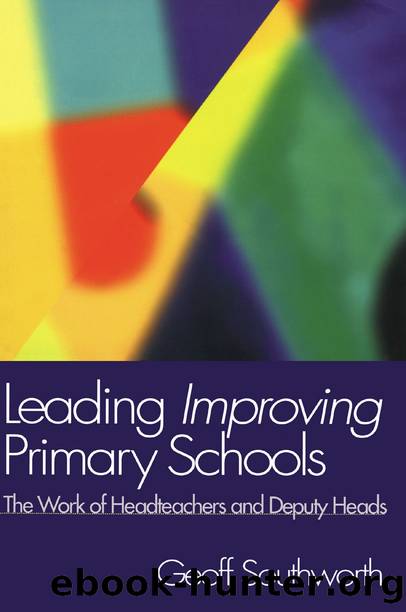Leading Improving Primary Schools by Southworth Geoff;

Author:Southworth, Geoff;
Language: eng
Format: epub
ISBN: 167275
Publisher: Taylor & Francis Group
Summary
All of the foregoing adds up to a number of key messages about what we know about primary headship. Headship is clearly more complex than formerly. The transition to LMS has been successfully accomplished and primary schools are now self-managing organizations. There has been an increase in the volume of management tasks at the school site level. Many heads have been able to delegate much of this work to support staff (although in smaller schools some heads are unable to shed the day-to-day tasks unless someone on the governing body, or someone known to the school, is willing to take them on for very little financial reward). Headteachers are now working longer days, spending many evenings back in school and often have only limited scope, in terms of time, to deal with their number one priority, improving the performance of the school. Therefore, whatever amounts of time heads have available for improvement activities needs to be used wisely and to greatest effect. This time should not be squandered but maximized.
School improvement is today largely school self-improvement. LEAs and external consultants have a role to play, but the improvement of the school is the core task for heads and senior staff as well as a professional responsibility of all colleagues. In terms of leadership, heads, along with colleagues, need to lead their schoolsâ improvement efforts. Leadership in this area is not an option, it is an obligation.
Improvement involves monitoring the work of the school. In particular heads need to ensure that pupilsâ achievements and progress are monitored and that the quality of teaching is observed, evaluated and developed. All of this requires heads to be researchers. They need to enquire into what is happening in classrooms and to record what they see so that, over time, they can begin to chart the course the school is taking on its improvement journey. Heads, therefore, need to develop their perception skills. Looking is necessary but not sufficient, they must learn to see; to observe closely and critically. This is not to imply that heads establish systems of surveillance, but that they take a keen and close interest in classrooms, in teaching and learning, in order to note successes and to develop deeper understandings about classroom processes and challenges.
In the light of all the information which heads and colleagues collect about the work of the school, heads with other colleagues then need to analyse and interpret the data. They must try to develop meanings from what they see. These meanings may be speculative, rather than conclusive, but, however provisional they may be they are an important part of diagnosing what might need to be focused on and what the schoolâs priorities for improvement should be. Embedded in this meaning making should be attention to pedagogy. Unless data on pupilsâ achievements and progress is linked to teachersâ classroom practices and strategies and to the development of teachersâ craft knowledge, understanding and teaching, then improvement may be less energetic and rigorous than otherwise. Developing teachers and teaching is a core task for school improvers.
Download
This site does not store any files on its server. We only index and link to content provided by other sites. Please contact the content providers to delete copyright contents if any and email us, we'll remove relevant links or contents immediately.
The Art of Coaching Workbook by Elena Aguilar(51199)
Trainspotting by Irvine Welsh(21668)
Twilight of the Idols With the Antichrist and Ecce Homo by Friedrich Nietzsche(18635)
Fangirl by Rainbow Rowell(9252)
Periodization Training for Sports by Tudor Bompa(8273)
Change Your Questions, Change Your Life by Marilee Adams(7783)
This Is How You Lose Her by Junot Diaz(6887)
Asking the Right Questions: A Guide to Critical Thinking by M. Neil Browne & Stuart M. Keeley(5775)
Grit by Angela Duckworth(5615)
Red Sparrow by Jason Matthews(5475)
Paper Towns by Green John(5191)
Room 212 by Kate Stewart(5123)
Ken Follett - World without end by Ken Follett(4734)
Housekeeping by Marilynne Robinson(4449)
The Sports Rules Book by Human Kinetics(4388)
Papillon (English) by Henri Charrière(4274)
Double Down (Diary of a Wimpy Kid Book 11) by Jeff Kinney(4272)
The Motorcycle Diaries by Ernesto Che Guevara(4102)
Exercise Technique Manual for Resistance Training by National Strength & Conditioning Association(4071)
